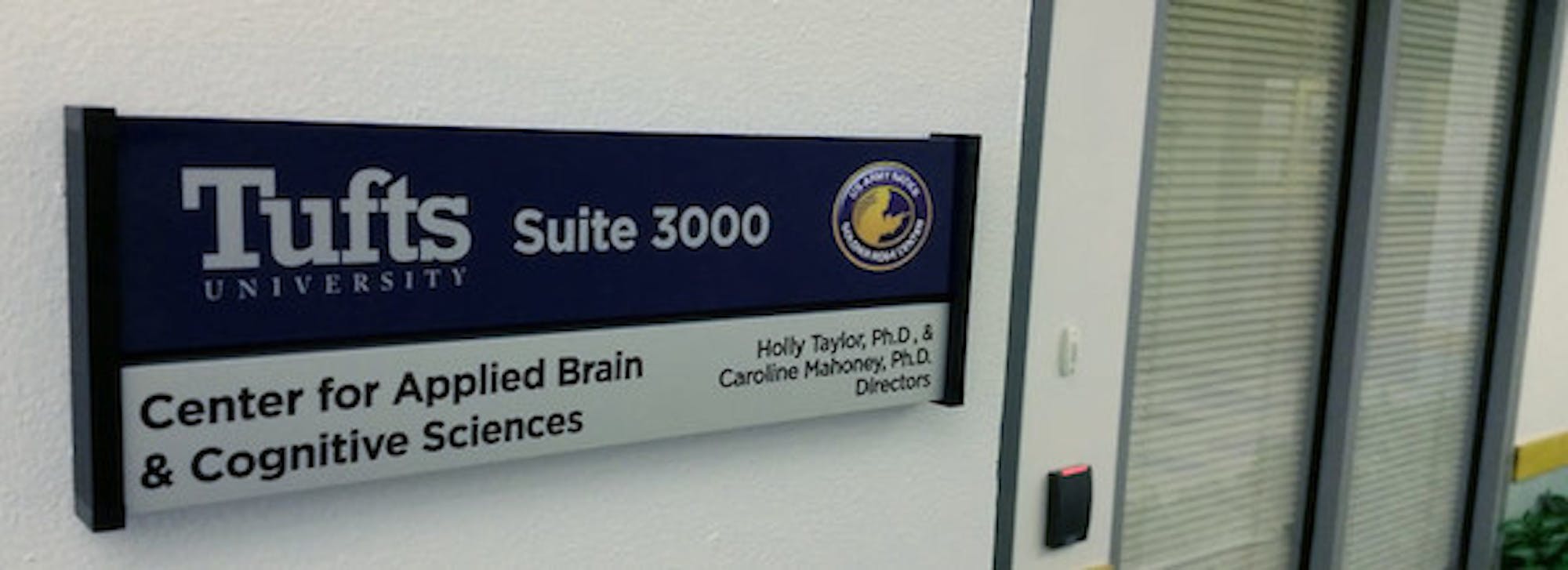Tufts and the U.S. Army Natick Soldier Research, Development and Engineering Center (NSRDEC) officially opened a co-funded Center for Applied Brain and Cognitive Sciences (CABCS) in mid-October on the Medford/Somerville campus after more than a year of planning and research on the project.
Caroline Mahoney, NSRDEC cognitive science team leader and co-director of CABCS, said that the center's launch was the culmination of years of collaboration between Tufts and NSRDEC.
"This center really came about from relationships [between Tufts and NSRDEC] that were built over the last decade and a half working together in the cognitive science area,” she said.
According to the center's website, the CABCS exists to bring together scientists and engineers from different fields of study to advance research and technology in cognitive and brain sciences.
According to Mahoney, that mission statement is put into practice in a variety of different topic areas ranging from nutrition to robotics.
“The work that we do on our team spans from anything looking at how the context in which a human operates influences performance — so by that I mean nutrition, physical fatigue, anxiety, uncertainty, any of those things — to how people interact with technology and how we can design technology better."
Heather Urry, Tufts psychology professor and one of the scientific managers of CABCS, said that she believes the interdisciplinary focus of CABCS will help the center address these varying topics more comprehensively.
"Because the CABCS facilitates collaborations between investigators from different disciplines, that means that people from different disciplines are coming together to the same research table to answer questions that otherwise couldn't be addressed, or couldn't be addressed as effectively, within one discipline alone," she told the Daily in an email.
CABCS Co-director and Tufts Professor of Psychology Holly Taylor also expressed the center’s interest in studying what she called "high risk situations."
“One of the things that the center is trying to do is trying to understand behavior in what we call complex, high risk environments. So that might be emergency first responders, medics or medical personnel," Taylor said. “They’re going to be stressed. They have to think quickly. They’re going to have emotional reactions to things that they’re going to see. And in trying to understand those complex sets of behaviors, we can a bring in the VR caves.”
Taylor explained that these "VR caves," also known as cave automatic virtual environments, are three networked virtual reality stations which monitor data based on an individual or a group’s eye movement, physical movement, physiological processes, and cognitive behavior as they navigate through a preset virtual landscape.
According to Mahoney, cave automatic virtual environments help the center's researchers by allowing them to test their scientific research in an entirely new and more realistic environment.
“[It helps by] moving from foundational science, basic science and translating that into more real world operational environments," she said. "So do those things translate over to when somebody is in a more realistic environment having to do real tasks underneath time pressure, uncertainty or anxiety based on the situation,” she said.
Urry explained how she believes these cave automatic virtual environments may also help supplement current research surrounding combat and war zone simulations.
"The [combat] experience certainly could be programmed to occur using a traditional laboratory set-up which would have participants seated at a desk in front of a monitor and keyboard," she said. "However, the fact that they're standing, that the virtual environment is life-sized and that they'll be holding a real-but-decommissioned rifle are all aspects of the VR environment that we think will increase the ecological validity of this work."
According to Mahoney, the center will be offering internships during the summer of 2017 on any of the center’s primary topics, including in the studies involving virtual reality.
“We think it is a really great way to get undergraduates exposed to research and exposed to laboratory science within the cognitive science domain,” Mahoney said.
ALLIES Co-Director Manal Cheema, a senior minoring in cognitive and brain sciences (CBS), said she is excited about the development of this center, noting that she has always wanted an opportunity to apply her background in CBS to her experiences working with military personnel through ALLIES.
"I think Tufts' new center ... will not only enhance our understanding of cognitive capabilities but is an innovative development in the collaborative relationship between the civilian and military sectors," Cheema told the Daily in an electronic message.
Taylor said that the partnership between Tufts and NSRDEC brought interdisciplinary opportunities to undergraduates, graduates and faculty across the university.
“Having the different ideas from different approaches that people take expands the way I have to think about things, which I find very interesting," Taylor said. "I can’t just stay in my little psych world."
Tufts, U.S. Army launch cognitive and brain sciences research center






